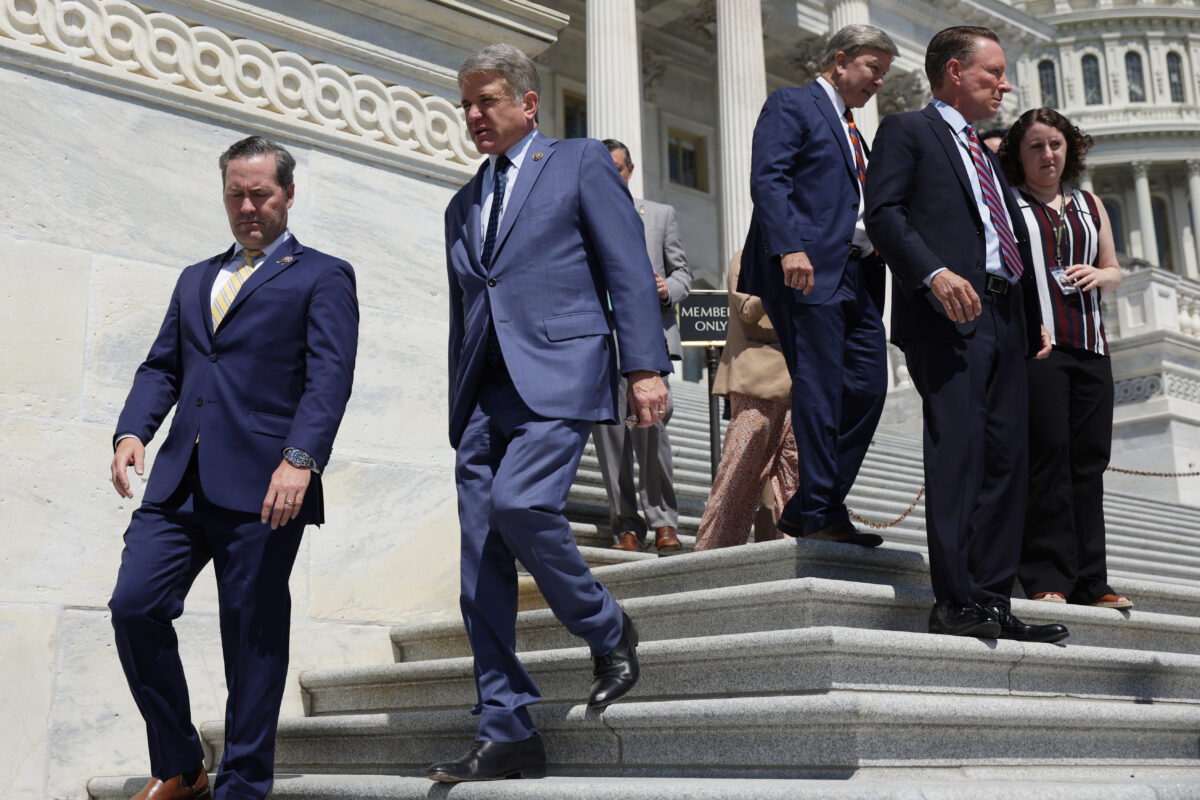Democrats divided on legislation allowing Congress to overrule White House on lifting Iran sanctions
The AIPAC-backed bill passed through the House Foreign Affairs Committee by a 34-16 vote

Alex Wong/Getty Images
Rep. Michael McCaul (R-TX) (2nd L) leaves after the passage of the National Defense Authorization Act (NDAA) at the U.S. Capitol on July 14, 2023 in Washington, D,C.
The House Foreign Affairs Committee voted on a bipartisan basis on Wednesday to advance Iran sanctions-related bills that would provide for a formal congressional review process to remove sanctions on Iran and would aim to ratchet up sanctions on Iran’s drone and missile program in anticipation of the expiration of United Nations sanctions later this year.
The sanctions oversight bill, the Iran Sanctions Relief Review Act, which was backed by AIPAC, ultimately split Democrats on the panel. The legislation would provide an opportunity for Congress to vote to maintain each Iran sanction that an administration wishes to lift. The committee approved the amendment by a 34-16 vote.
The committee’s ranking member, Rep. Greg Meeks (D-NY), argued that the bill would “damage America’s ability to conduct effective diplomacy” by undercutting U.S. negotiators in talks with Iran, kneecapping any potential efforts to deescalate tensions with Iran, and potentially undercutting diplomats in other arenas in the future.
“Carefully negotiated agreements risk becoming subject to partisanship in the United States Congress,” Meeks continued. “Such action is worrisome to me and without precedent.”
He also claimed that the legislation runs counter to the broader goals of U.S. sanctions campaigns.
“Sanctions are meant to be lifted if they achieve our goals,” Meeks said. “Our nuclear sanctions were not passed to foment regime change in Iran, no matter how much we may hope they were. They were designed to drive around to the table and to negotiate the end of their nuclear weapons program.”
Reps. Brad Sherman (D-CA), Ted Lieu (D-CA), Kathy Manning (D-NC), Greg Stanton (D-AZ), Jared Moskowitz (D-FL), Jim Costa (D-CA) and Brad Schneider (D-IL) broke with Meeks and other Democrats to vote in favor of the bill.
Rep. Keith Self (R-TX), the lead sponsor of the bill, said he is “very concerned that this administration intends to bypass Congress completely.”
“This bill reaffirms Congress’ important role in deciding if and when to relieve sanctions,” he continued.
Meeks proposed an amendment to the bill that would remove the provision providing a mechanism for Congress to vote to block the removal of sanctions. The amendment failed by a voice vote.
“This amendment would really render this bill effectively useless,” Self responded. “I will add, this Congress does not want to put Israel in the position to defend itself against a potential nuclear Iranian state committed to the destruction of Israel.”
The bill faces an unclear future in the Senate; it was first introduced by Republicans in both chambers in 2021, but did not see any movement in the Senate, which remains under Democratic control.
The other bill, the Fight CRIME Act, would ramp up sanctions on Iran’s drone and missile program ahead of the expiration of U.N. restrictions in October, as well as demand the administration provide a strategy for navigating the expiration of those sanctions, passed with strong bipartisan support. The bill was approved by a unanimous vote.
“If this U.N. ban expires, Iran will be free to openly transfer these lethal weapons to autocrats, war criminals, terrorists proxies around the world without restraint,” Rep. Michael McCaul (R-TX), the committee’s chairman, warned. “This bipartisan legislation makes clear that the United States and its allies and partners will hold those enabling Iran’s missile and drone proliferation accountable, regardless of whether the U.N. restrictions remain in effect.”
Meeks, who is also a sponsor of the legislation, noted that “Iran’s short- and medium-range missiles pose a direct and deadly threat to American forces in the region, and the territories of numerous allies and partners.”
“In October, when the U.N. regulations expire, Iran would be free in the eyes of the U.N. to develop nuclear weapon delivery systems, including ICBMs that could reach the United States homeland,” he continued.
Meeks explained that, although Iran has consistently defied and evaded the U.N. sanctions, it would gain freer access to advanced technologies from around the world that would allow it to advance its missile program significantly.









